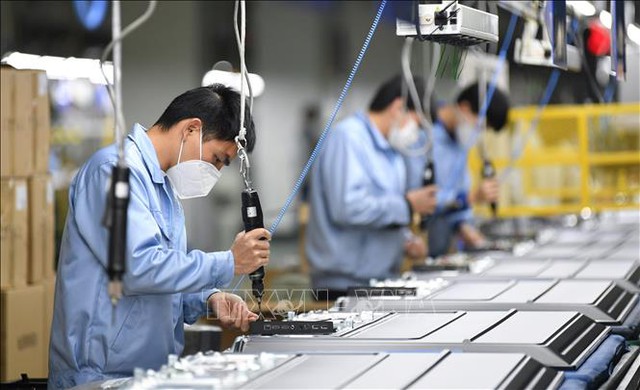China: Plans to spend more than 7 billion USD to upgrade chip supply chain
- Tram Ho
At a chip supply chain conference held recently in Guangzhou (China), Mr. Chiu Tzu-Yin, Chairman of the National Silicon Industry Group (NSIG), said: ” We cannot avoid it. decoupling from semiconductors. This will be the biggest opportunity for Chinese enterprises to produce manufacturing machinery and materials .”
As imports of foreign-made chip-making machines have slowed due to US restrictions, Chinese companies specializing in the production of chip-making equipment and materials have been in the spotlight thanks to subsidies and investment packages. under the auspices of the Government under the Made in China 2025 initiative.
According to Chinese media reports, about 35% of China’s semiconductor factories will use domestic equipment by 2022, up from the corresponding 21% in 2021. A Chinese brokerage said that the Domestic companies have won nearly half of the public tenders for equipment purchases from leading chipmakers in China by 2023.

Production workers at a Skyworth factory in Guangzhou, capital of Guangdong province, China. Photo documentary: THX/VNA
David Wang, CEO of ACM Research, which specializes in wafer cleaning equipment, said: “ Global political conflicts are likely to usher in a golden age for China’s semiconductor machinery sector. China “.
Naura Technology Group, China’s leading chip-making equipment maker, achieved sales of 14.6 billion yuan last year, more than six times its 2017 revenue. The state purchased an American manufacturer of wafer cleaning equipment in 2018 and expanded its business portfolio to include specialized products for engraving.
Naura supplies China’s leading SMIC Semiconductor Manufacturing Corporation, as well as Yangtze Memory Technologies Corp., a Chinese semiconductor integrated device manufacturer specializing in flash memory chips. Naura is investing 3.8 billion yuan to build a factory in Beijing, which is expected to start operations next year.
The 2022 sales of Advanced Micro-Fabrication Equipment, China’s second largest chip-making equipment and materials manufacturer and engraving equipment manufacturer, increased nearly fivefold compared to 2017. the product of this state-backed enterprise can process advanced 5 nanometer semiconductors. Advanced Micro-Fabrication Equipment is building a 1.5 billion yuan factory in Shanghai.
Sales of chip-making equipment in China totaled 52 billion yuan last year, about six times more than in 2017. Some 62 billion yuan of chip-making materials were also sold in 2022, nearly triple the figure of 2017. NSIG’s revenue has grown nearly fivefold in that time, and the group has raised 10 billion yuan in the last year alone.
Beijing plans to further support domestic chip-making equipment and materials companies in the face of growing competition with Washington. China is currently leading the world in chip-making equipment sales for the third year in a row in 2022, despite a 5% drop from 2021. The industry’s demand is expected to increase in 2023. , especially as Chinese chipmakers forecast new US export restrictions.
In addition, foreign companies are also eyeing opportunities in China, the world’s largest chip market. About 30% of the total sales of the three largest US chip-making equipment manufacturers last year were in China, according to Chinese research organization ChipInsights.
Source : Genk
